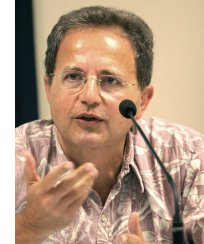APOC provides strategic-level view of Asia-Pacific region
|
|
|
Broadening their understanding of the complex Asia-Pacific region, 150 security practitioners completed the Asia-Pacific Orientation Course Jan. 29 in Honolulu. Conducted at the Daniel K. Inouye Asia-Pacific Center for Security Studies, the course educated participants on the myriad factors that impact the region’s security environment. Primarily mid-level military officers and their civilian equivalents took part in discussions centered on socio-economic, political, defense, health and environmental issues. This APOC iteration included the Center's first cohort of deaf security professionals, which included Edward Chevy (pictured at left), of Pacific Air Forces' Disability Communication Access Board. |
|
|
CSC workshop facilitates education collaboration
|
In an effort to advance regional cooperation in professional military education, the Daniel K. Inouye Asia-Pacific Center for Security Studies facilitated a three-day workshop Jan 12 to 14. Titled “Command and Staff Colleges in the Asia-Pacific: Next Steps Towards a Framework for Cooperation,” the event brought together 27 participants from 11 nations and 18 institutions in the region. Pictured above, Lt. Col. Saiful-Akhmar Shariff, with the Royal Brunei Armed Forces, and U.S. Air Force Lt. Col. Jody Dow, both professional military education officials, discuss issues associated with moving forward on a vision for regional education collaboration. To read more, click here.
|
|
Maritime security cooperation workshop in session at DKI APCSS
|
The "Maritime Security Cooperation: Engagement through Education" workshop is in session at DKI APCSS Feb. 3 to 5. The event was comprised of roughly 30 scholars and regional leaders in defense education who are working to identify regional needs for and best practices in maritime education. The Center continues to evolve its support of regional MARSEC cooperation in response to increased U.S. government emphasis on maritime security capacity building and cooperation as evidenced by Secretary of Defense Ash Carter’s Shangri-La remarks in May 2015.
|
|
Dr. Rouben Azizian departs Center for New Zealand position
|
 After more than a decade of service, Dr. Rouben Azizian bid farewell to DKI APCSS. A professor for nearly 14 years, Azizian left the Center in December to become director of Massey University’s Centre for Defence and Security Studies in New Zealand. Azizian arrived at the Center in January 2002, bringing with him expertise in regional organizations and Eurasian security. While here, he became one of the Center’s leading lecturers on security sector development. As a senior member of the DKI APCSS faculty, the former Soviet diplomat helped enhance the leadership and problem-solving skills of thousands of security practitioners across the Asia-Pacific region. To read more, click here. After more than a decade of service, Dr. Rouben Azizian bid farewell to DKI APCSS. A professor for nearly 14 years, Azizian left the Center in December to become director of Massey University’s Centre for Defence and Security Studies in New Zealand. Azizian arrived at the Center in January 2002, bringing with him expertise in regional organizations and Eurasian security. While here, he became one of the Center’s leading lecturers on security sector development. As a senior member of the DKI APCSS faculty, the former Soviet diplomat helped enhance the leadership and problem-solving skills of thousands of security practitioners across the Asia-Pacific region. To read more, click here.
|
|
Faculty publications and media
|
|
While attending APCSS courses, Fellows are required to complete a Fellows Project, which may be done as a presentation, research paper or policy brief. APCSS is now making these papers available online with our new “Alumni Perspectives” publications.
Pradeep Kumar (ASC 15-1), director, Adjutant General, in India’s Ministry of Defense, authored “Empowerment of Smaller Powers in South Asian Security Cooperation.” His paper analyzes the security concerns of smaller powers in South Asia and their possible long-term impact on relations with other nations in the region and beyond. In the document, he provides recommendations to help build cohesiveness and confidence building in order to achieve combined goals.
Irfan Abubakar (ASC 15-1), director of the Center for Study of Religion and Culture in Indonesia, crafted the paper “Effective Strategic Communication in Countering Radicalism in Indonesia.” Abubakar states that his paper analyzes the level of effectiveness with which the Indonesian National Counterterrorism Agency (BNPT) has managed to deliver its message to target audiences in order to shape their opinions and behaviors towards radical ideology. He believes that "in order for the government to effectively shape people’s minds and behavior with regard to the threat of radicalism, it is necessary to ensure the clarity of the message, to enhance understanding of the target audience, and to maximize use of different channels of communication."
|
|
|
|
Jan. 19: Staff Delegation representing members of the U.S. House Armed Services Committee.
Jan. 25: Mr. David Rank, U.S. Deputy Chief of Mission, U.S. Embassy, Beijing, China.
Jan 28: Col. Dorjjugder Munkh-Ochir (EC 05-2), Director, Military Intelligence Agency, Mongolia
|
|
Our latest edition of Currents magazine, published Dec. 11, 2015, is available here.
|
|
If you have a new e-mail address, please update your subscription to ensure you are getting the latest DKI APCSS updates. Mahalo.
If you have any questions please contact the editor at hallj@apcss.org.
|
|
|